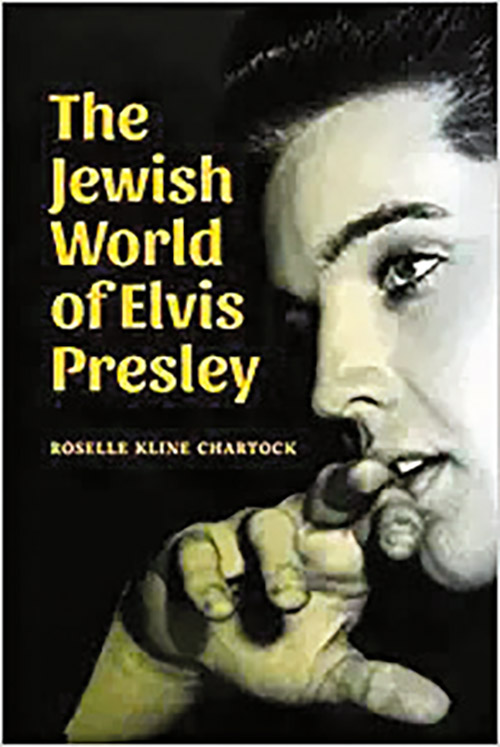
Highlighting: “The Jewish World of Elvis Presley” by Roselle Kline Chartock. Independently published. 2020. English. Paperback. 276 pages. ISBN-13: 979-8686604445.
King David, a singer and musician, was the legendary monarch of Israel. But another Jewish singer and musician was the “king of rock and roll,” and his home and burial place have become a pilgrimage site to many. His story is not in the Bible, but in “The Jewish World of Elvis Presley,” written by Roselle Kline Chartock.
Unlike many teeny-boppers of the 1950s, Chartock was not an Elvis Presley fan. She became a history teacher and the first woman in the United States to create an inter-disciplinary Holocaust six-week curriculum. Published by the ADL and Bantam Books, it was pioneered in Teaneck and Vineland, New Jersey. She herself had grown up in Hudson, New York. Hungarian Jews flocked there early in the early twentieth century. Chartock spent most of her life in the Berkshires, where she raised her family.
Presley was a revolutionary who stirred the ire of parents, clerics and the media. It wasn’t his words, but his style and embrace of what was called “race” music in the pre-civil rights era. Ed Sullivan vowed never to have him on his popular television show. He relented, but would only allow him to be shown from the waist up in the first of his appearances on September 9, 1956. However, it was neither his cultural significance, historical influence nor rumors of his Jewishness that captured Chartock’s interest in writing a book about him. Roselle Chartock favors, collects and regularly wears vintage clothes (of the 1940s-50s.) One evening, while thinking about postwar clothing, Presley, a fashion icon, suddenly came to mind.
Wondering who his tailor was led Chartock to discover that his interest in fashion began in his youth when he was an usher at Memphis’ Loew’s State Theater. During his breaks, he would go to a haberdashery near the theater to admire the window displays. He was very poor and dreamed of being able to afford such nice clothes.
The shop was owned by Jews, Max and Bernard Lansky. One day, Bernard started up a conversation with the young window shopper, who told him that someday, when he became rich, he wanted to buy him out. Lansky retorted, “Don’t buy me out, just buy from me.” That was the beginning of a long and friendly relationship.
Bernard extended credit to Elvis for his first major performance and the singer became a devoted customer for the rest of his life. When he was buried at the age of 43, he was dressed in a white suit from Lansky’s.
What Chartock also discovered is that, Halachically speaking, Elvis was Jewish, and this connection mattered greatly to him. He was extremely devoted to Gladys Presley, the great granddaughter of Nancy Burdine, a Jewish immigrant from Lithuania. Burdine had converted to Christianity when she married an American, and her descendants practiced Christianity.
Elvis’ mother told him the two of them had “Jewish blood,” but never to mention it. Many Southerners, including his father, were virulent anti-Semites. Elvis, a spiritual soul, found it confusing that Christians in the First Assembly of God services he attended glorified the Jewish founders of Christianity and heaped praise on the Jewish prophets, yet cursed Jews.
His manager, Colonel Parker, also a vicious anti-Semite, was exceedingly greedy and controlling. Parker refused to allow his client to accept Jewess Barbra Streisand’s offer as the leading man in her remake of “A Star is Born”. (The original screenplay was written by another Jewish woman, Dorothy Parker, nee Rothschild, and her husband, Alan Campbell.)
Those closest to Elvis believe that Gladys’ untimely death from cancer set him on a collision course with “my medicine,” to which he became addicted and which eventually caused his death.
His buddies in the “Memphis Mafia,” as his group was known, included many Jews. An Orthodox rabbi and his wife who lived in the same housing project as the Presleys were friendly and kind to him. Larry Geller, his barber and hairstylist, was grounded in Jewish knowledge, including philosophy. He became Elvis’ guru, giving him books and teaching him about Jewish philosophy and gematria.
When Elvis learned that 18 was the symbol of life, he had a large gold “chai” made and wore it around his neck. He was also generous to Jewish charities.
Although rumors of his Jewish background circulated for years, they were generally dismissed. It was said that he had a Jewish star carved on his mother’s tombstone. His and his parents’ gravestones at Graceland do not indicate that. However, recently, an archivist at Graceland found Gladys’ original tombstone in a storage facility on the site. After Elvis’ death, the Presleys had been disinterred and re-interred in Graceland with new tombstones.
Genealogists often haunt cemeteries. Those who study Jews have found that many people who didn’t or couldn’t live as Jews often chose to be buried as Jews. Thus, unlikely as it seems, Elvis Presley was the great-great grandson of a Jewish woman.
By Barbara Wind













